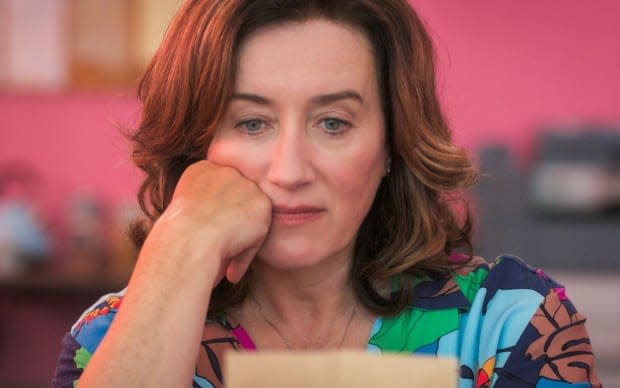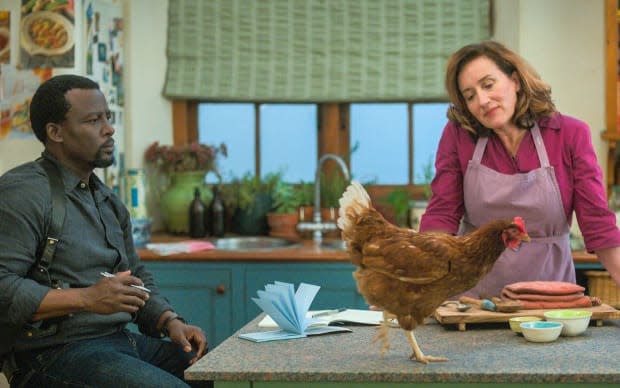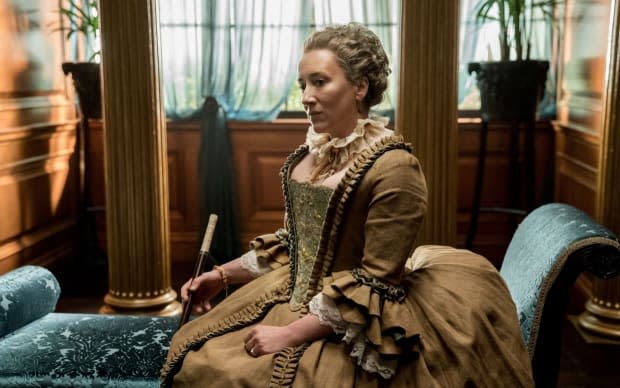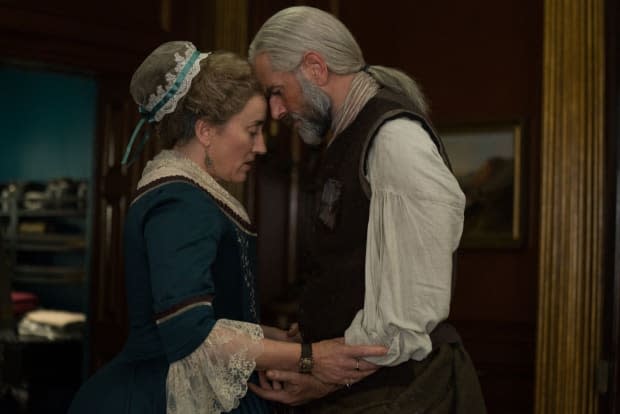'Outlander' Star Maria Doyle Kennedy Gets Her Sleuth on in 'Recipe for Love and Murder'
We ask Maria Doyle Kennedy, who stars as Aunt Jocasta in the historical epic "Outlander," whether she'll be back for season 7!
Outlander star Maria Doyle Kennedy is cooking up a recipe to help solve a murder in the upcoming Acorn TV Original, Recipes for Love and Murder, premiering Monday, Sept. 5.
Kennedy, who stars as Aunt Jocasta in the historical epic Outlander, goes thoroughly modern Maria in the 10-part cozy mystery Recipes for Love and Murder, based on Sally Andrew’s best-selling novels A Tannie Maria Mystery, as a recipe-columnist-turned-advice-columnist in a small town in South Africa, who continues to serve up food suggestions along with the personal guidance she doles out.
“When I was sent the script for Recipes, I was reading a lot of stuff at the time and so much of it was about serial killers and the many and gruesome ways that they kill women. I was so tired of it, and I was kind of angry about it, as well,” Kennedy tells Parade.com in this exclusive interview. “I read this, and it was literally like a jewel in the middle of the sea of crap that I was reading. It felt tender and warm, but also clever. Sometimes the tender, warm, cozy things are not very smart and then I get bored. I found it clever and inventive. I could imagine watching it with my mom and also with my children.”
As the story begins, Tannie Maria has moved to the small town to escape her own demons so it’s surprising that she volunteers to write the advice column when she is fired from her food column, and even more so when it turns out that she is good at it.
But things take an unexpected turn when a woman who writes to Maria about her abusive husband is found dead and Maria quickly figures out that the victim is her letter writer. Maria’s worlds collide as she begins working through her own mysterious past while trying to solve the case.

Courtesy of Acorn TV?
“She travels to the center of this small town every day to work and it’s clear when she’s there that she interacts in a friendly way with people, that she’s warm, that she’s happy, that she has friends,” Kennedy continued. “But then you see her in her home life, and she lives on her own in a farmhouse, quite a way from the town, quite isolated. Nobody comes there really until they get into trying to solve this new mystery. Then new people start to come into her life. It’s kind of clear that the two Tannie Marias, sort of the outer and the inner, are separate.”
Related: Want to Crack the Case? These Are The 101 Best Mystery Books of All Time
When the local police aren’t interested in hearing what Maria has to say about the letter writer’s death, she joins forces with a local, risk-taking, rookie journalist, who also wanted to write the advice column, Jessie September (Kylie Fisher), to investigate and catch the killer.
But before the mystery can be solved, a lot of delicious food is devoured as the twist for Recipes for Love and Murder is the dishes that Maria whips up in her kitchen help her think through the clues of the crime.
“Cooking is a language for her,” Kennedy said. “I think that when she was unhappy herself, even before she came to the Karoo, she cooked as a way of disassociation really, as a way of getting out of her head. Cooking for her is not thinking. It’s a deeper thing, it’s an absolute processing of whatever is going on and a way to figure out a way forward. Food is definitely her language.”
Also, during our interview, Kennedy shared more thoughts on who Tannie Maria really is, what she’s hiding from, as well as some Outlander scoop on Aunt Jocasta, but not if she will be returning for Season 7. She didn’t want to have to kill us!
Will we find out the reason that Tannie Maria’s hiding away in this small town in South Africa, as people back in Scotland search for her?
Her reason for being in this small town in the Karoo in South Africa in the first place is she inherited the home from her aunt who was Afrikaans. When her mom died, a solicitor came to tell her that she now owned this property. She decides to cut and run and leave Scotland where she’s grown up but hasn’t been very happy and go to the Karoo. Her cutting and running is not so much a plan as a reaction. It’s a not dealing with things that bring her there as opposed to it’s time for new adventure. It’s an escape.

Courtesy of Acorn TV?
You start to see that how she copes or how she interacts with people is that she represses her feelings mostly. She has a whole lot of stuff that she has not examined, has not looked at. As we go through the show and all of these little mysteries unveil themselves, it becomes clear that there are a lot of things coming up for her that are triggers, that are a reminder of unhappiness and trauma from her past. She’s not really going to fully be able to be herself or form relationships unless she deals with it. That’s certainly something around the journey that we do find out more about for sure.
Tannie Maria makes the transition from food columnist to advice columnist. Do you ever read advice columns? Are you someone that friends turn to?
I think we do that a lot as Irish people. I think it’s part of our culture to talk things out. I come from a big, extended family, we’re very close. I would certainly talk to my siblings a lot, and they to me. I have a favorite aunt who’s just ten years older than me. I always have gone to her for advice and to talk about things all through my life. My friends and I certainly solve problems by sitting around and talking to each other, sometimes with and sometimes without wine. The advice is probably different depending on whether or not the wine is involved.
I don’t know, though. I think sometimes that advice is overrated. Sometimes you don’t really need to be coming up with solutions for people, do you? I think that the best thing about answering a problem is to talk to somebody about it. Here, anyway, we would say a problem shared is a problem halved. I think if you are just open to talking to people about what’s going on with them, just the saying it out loud, allows them to hear what they’re really saying and thinking. And in that way, I think people solve their own problems. But they have to have somebody else to say it out loud to.
I presume that that’s the basis of therapy in a way, but I don’t really know. I don’t know how good I am at it, but certainly my friends and I share our stuff with each other. I think I’d probably have to get a few of them here and ask them what they think about the quality of my advice, and they could answer it for you.
Let’s talk about the food porn, because how could we not? The food that Tannie Maria cooks looks so yummy. Cooking or baking, because she does both, seems to be a way for her to clear her thought process. She gets a letter for her advice column, and it’s a really hard letter to solve, so she goes home and she bakes a cake or something. Do you think that’s part of her mental process, that it’s more than just feeding people?
We tried hard to think about how to show it, because we’re not a cooking show, we’re not making Nigella Lawson, and we don’t have 10 million separate ovens in the back and a whole load of commis chefs. I did find that I was tasting everything and smelling it because you can’t taste or smell it through the television, so you have to try and convey that. I know that I did do that myself. I hope it does look as good as I was feeling it.
Related: You'll Want to Indulge in Nigella Lawson’s Berry Delicious Cherry and Almond Crumble
But then I found that always the way to experience it or to express it further was to share it with people. I think she’s learned that she can do that with people, whereas sometimes you might not be able to sit down and have an hour-long heart to heart. She certainly wouldn’t be revealing herself; she would be trying to hide herself. She can make this food and she can break bread with people, she can share that experience with people. That becomes a way to make friends and to become close to people. It was a huge thing to think about, actually, and learn and experience.
There’s that very fun line in there where the detective says to her, “Do you lick everything” after she licks the pomegranate juice at the crime scene.
Well, I do love her thought process, as well. Again, food is the language and she’s just like, “Oh, that stain, what is it?” So, she licks it. She’s never going to worry about leaving her DNA at the crime scene or anything. It made me think about the way she pieces things together in an unusual way, in an observant way. It’s so connected to how people look, what they’re eating, what’s in their shopping bag.
It really made me think of when we all were going shopping at the beginning of COVID, and we didn’t know what was going to happen at the beginning. Were the shops going to close? How long was it going to last? We were all just at the supermarket with our little basket of shame, seeing who was stocking up on the double vodka bottles, who was buying loads of frozen pizza, and who was going, “I’d better buy loads of really healthy frozen veggies.” It made me think about that, that she decides things about people based on what would be in their basket. If they’ve got extra quantities, are they having somebody over? She’s so observant, but in an unusual way. I loved it.
Maybe it’s the food element, but also the fact that Maria has a chicken for a pet, that I think of this as a cozy mystery, something that the whole family can watch, as opposed to a more bloody and gory darker murder mystery. Do you like cozy mysteries or are you more into the dark true crime stuff?
It depends on what’s made. One of the best things I’ve ever seen is Succession, which I’ve just been scooping up into my mind. But that’s not particularly violent.
I love that idea that people will get this at the different levels. I think there isn’t enough of that. Some people will just be laughing more at the chicken and then some people will go, “Oh, look at the cleverness of that,” and they’ll get the little intricacies of the clues dotted along the way. It was a huge part of it for me and the minute I started reading it, I read all 10 episodes in one night.
It was during COVID, so I couldn’t go and meet. I made a self-tape; I practically made a short film I wanted to do it so much. Honestly, I had my husband down in the kitchen videoing me putting things in and out of the oven and chopping up garlic and all this. He was like, “What are you on?” I was like, “I really want to do this job. I really want to do it.” No, it was a big, big job for me.

STARZ
Are you allowed to say if you’re back for Outlander season 7 or not? Aunt Jocasta is still in the book, but they don’t always follow the book.
I’m not allowed to say, Paulette. I could tell you, but I’d have to kill you.
Related: Outlander's Duncan Lacroix on Murtagh's Death and Working with Sam Heughan
Aunt Jocasta is a unique character for a woman in the 18th century. She runs a plantation on her own and she only gets married so her husband will keep her safe from other men scheming for her fortune. So, she’s the alpha in the relationship. Was that an appealing angle to play?
I did think that it was just an interesting thing to be able to do, to stay at that level of the game. You see her, obviously, she has very loving moments and very deep feelings, particularly for Jamie (Sam Heughan), for her nephew, and for a few other characters who come back into her life. But she can be ruthless, as well. That she’s manipulative, that she’s had to manage a lot of hostile situations in order to maintain control of what she has, she’s capable of a lot. That was interesting to me, that she really had all of those things about her. I think people are like that. I think they’re not just complicated, I think they’re sometimes contradictory. She was like that to me.
Also, of course, playing somebody who can’t see, I’d never done that before. I knew I’d learn a lot about myself and my body and physically that I’d have to change a lot of the way I normally would move or act. So that was, of course, a great personal challenge.
You talked about her deep feelings, and in the series— it’s not in the book, but they created this love affair between Jocasta and Murtagh. What was it like for a woman of a certain age to have that passionate affair on screen?
Why would we think that people of that age don’t feel that way? That’s just a ridiculous thing to perpetuate. So, I was really glad to bust it a little bit. Of course, people of any age can have enormously deep feelings and probably are more fearful about them and find the risks so great at their age. But, also, they know that time is not on their side, so if they really want to have an opportunity at something big and deep like that, they’re going to have to take it. All of that and all of her questioning herself about it -- I was thrilled.

STARZ
It was funny, when they first meet and she flings the glass of whiskey at him and he’s going off, you realize the depth of their attraction and their feeling. [Showrunner] Matt Roberts said, “People are going to love you.” I was going, “Well, they will until they get to that one and then they’re going to hate me because they’re so crazy about Murtagh they won’t be a bit happy about him going off with Jocasta.” But, of course, people were so happy to see Duncan Lacroix back as the Murtagh character that they just were great to us. They were really on our side.
Recipes for Love and Murder premieres on Monday, Sept. 5 on Acorn TV.